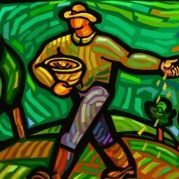-
Posts
790 -
Joined
-
Last visited
-

I have trouble with this verse
Deborah_ replied to faithfull-prophet4040's topic in General Discussion
The initial sin that we have to repent of is our rebellion against God's authority. (All other sins are symptoms and consequences of that one). You can't trust in Jesus without that repentance - it would be a contradiction in terms. You can't have faith in Jesus without calling Him Lord. But then, if our faith (trust) and our confession are genuine, we will obey our Lord (Luke 6:46). As James puts it, faith that doesn't have some kind of practical outcome ("works") isn't a real living faith (James 2:14). So we are saved by faith - but works are the evidence of faith. No works, no faith. -

Matthew 16, Verse 28
Deborah_ replied to Mozart's Starling's topic in Have a problem? Looking for advice?
The Kingdom is, basically, where Jesus reigns. So there's more than one sense in which the Kingdom can 'come'. Obviously it will come in its fullness when Jesus returns, but it's present on earth now, wherever His people are. So personally, I agree with Other One. I think Jesus was referring to Pentecost. Then the disciples witnessed the outpouring of the Holy Spirit, the preaching of the gospel to people from all nations, and the beginning of the Church - all proof that Jesus was enthroned at God’s right hand. -

What does it mean to believe in the Messiah?
Deborah_ replied to Kynan's topic in Do you want to just ask a question?
"Believe in the Messiah" is a rather vague statement. All Jews believe in A Messiah. Christians believe that Jesus is the Messiah. Needless to say, that goes along with believing that what He says is true. And genuine belief leads to commitment - in other words, following Him and obeying His teaching. -

Hypothetical question
Deborah_ replied to faithfull-prophet4040's topic in Do you want to just ask a question?
When Jesus says, "Love your enemies", He's referring to human beings. No exceptions. However, "loving" them can take many different forms. In some circumstances, calling the police may be the right thing to do (a criminal conviction may be what leads them to repentance and faith). Also we mustn't forget our obligation to love our families and neighbours - which usually means taking a stand against crime and violence. As for demon possession, if that really is the case (and it's easy to label someone as 'possessed" when in fact they're mentally ill or there's some more ordinary reason for their behaviour), then there's no such thing as a demon too strong to be cast out. There's no record of Jesus (or the apostles after the Resurrection) not casting out a demon. The problem isn't the demon, but us. The problem with hypothetical questions is that they can be formulated with internal contradictions, which makes them unsolvable. -
Fishing can be a fruitless occupation, whether you’re using a net or a line. After hours of working or waiting, you may catch nothing at all - or what you do catch may not be what you want. It may not even be a fish; unfortunately our rivers and seas are so full of rubbish now, that a fisherman’s catch may consist largely of plastic debris! Galilean fishermen in the first century didn’t have to contend with plastic waste, but they were used to throwing away a large proportion of their catch because it was unsuitable for human consumption in one way or another. And when Jesus’ disciples started “fishing for people” they would find it a similar experience - because not all those who make an initial response to the Gospel (and not even all those who get as far as joining a church) will actually turn out to be genuine Christians. To some extent we can weed out the people who obviously don’t belong; but even so, it’s inevitable that our churches will have a mixed membership. Only God knows who is truly ‘in’ and who is ‘out’ - and He won’t remove the ‘bad fish’ until the Day of Judgement. “Therefore judge nothing before the appointed time; wait until the Lord comes. He will bring to light what is hidden in darkness and will expose the motives of the heart.” (I Corinthians 4:5) In the meantime, we need to remember that church membership is not a guarantee of eternal life. Even in an apparently well-established congregation, there may well be some individuals who do not believe - and so the preaching of the Gospel shouldn’t be confined to “outreach” events. There is also an implied warning to anyone who thinks that merely attending church will count in their favour on Judgement Day. The one criterion for entering the Kingdom is faith in Jesus; without it, you are an unbeliever… and you will suffer the fate of the unbeliever.
-
The early Christians used the Greek word for "fish" (ichthus) as an acronym: Iesous Christos Theou (h)Uios Soter = Jesus Christ, God's Son, Saviour. And so the fish became a Christian 'secret sign'
-
The custom of giving a double portion to the firstborn wasn't unique to Israel; it was pretty standard throughout the Middle East at that time. So it wasn't something that God had instituted, it was just a cultural tradition that Abraham's family continued to practise. Other cultures have other traditions, although most give preference to the eldest son in some way. But this 'preference' related to distributing the inheritance, it wasn't connected to the degree of love that the parents had for each of their children. It's interesting that the patriarchs often overrode this tradition, or were even instructed by God to do so. Jacob was preferred over Esau. Jacob later gave Ephraim (Joseph's youngest son) a greater blessing than Manasseh (the elder) (Genesis 48). And Jacob's three eldest sons forfeited their privileges by their scandalous behaviour, so the blessing of being "eldest" was passed to Judah (Genesis 49).
-
My husband used to be the verger of an Anglican church, and one of the things he had to do was manage the graveyard. It has put me off being buried, I can tell you! In the UK, burial land is in very short supply. You can only "own" a burial plot for 100 years - after that, what's left of you may be dug up and relocated. My husband and I are both going to be cremated. Then our ashes will be "scattered" in our local cemetery. ("Scattered" is rather a misleading term here; they won't be literally scattered, just buried in an unmarked place. However, the cemetery keeps a record of exactly where they are; we were able to bury my Mum's ashes in the same place as my Dad's, although there was 12 years between their deaths.) There's no Biblical prescription for how we dispose of our bodies. A number of methods are mentioned in the Bible - including cremation (Saul and his sons were cremated).
-
The alphabet was invented in Egypt in around 1800 BC, while the Israelites were enslaved there. Before that there was only picture writing (cuneiforms and hieroglyphs). Picture writing is cumbersome and takes up a lot of space - it's not an appropriate vehicle for recording God's word accurately. Also, it's so complex that very few people could learn it - it wasn't within the reach of ordinary people like Abraham. I find it truly amazing that the tool needed for recording God's word was invented at just the right time (and the right place) for Moses to make use of it.
-
I had my booster this week.
-
Where did you read that? When it said "higher chance" did it mean "higher than in the first 90 days" (which is to be expected because immunity wanes over time) or "higher than before you had the vaccine" (which seems highly unlikely to me).
-

Question about fornication
Deborah_ replied to Mochayum's topic in Have a problem? Looking for advice?
The most effective form of contraception (birth control) is an aspirin tablet... held tightly between the knees. (old contraception clinic joke) -
Piracy is a form of theft - so, yes it is against God's law. However, many books are much cheaper to download than to buy in printed form. And there are some (mainly older novels that are out of copyright) that can be downloaded legitimately for free.
-
TB is the one that often leaves a scar




.thumb.jpg.8e7493710ad482316dfdbd4399094be7.jpg)




